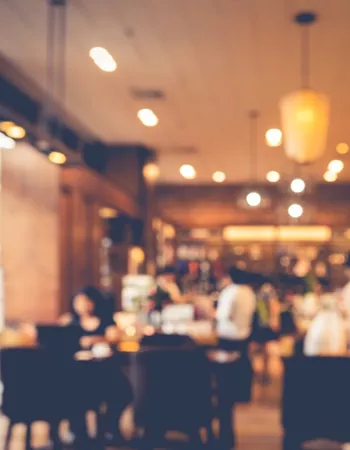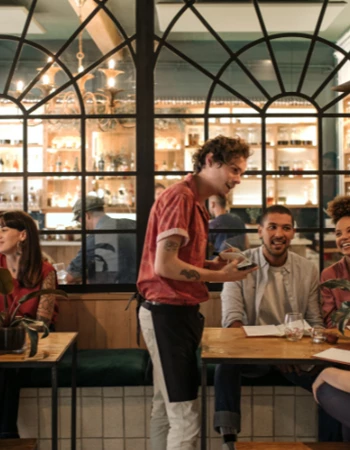-
- Solutions by business priority
- Boost efficiency and profitability
- End to end workforce management
- Attract customers and increase bookings

How to manage restaurant reservations
Are you considering your options when taking reservations in your restaurant? You might be looking for a restaurant booking system for the first time, or you’re unhappy with your current software supplier.
The digital world has opened multiple channels from which your customers can place a reservation in their chosen venue either through online channels, over the phone, or via social media – so, you need a system that can support all the channels you want to utilise.
 12 min
12 min

Written by Chris Moore
Discover the different types of reservations an online booking system can support, and how they work so you can decide how best to manage reservations in your operation.
Why are restaurant reservations important?
Restaurant reservations are important because they help improve your customers' experience, your customers can;
- Book a table in advance
- Choose a date and time that suits them
- Easily see if there is availability on their chosen date and time
- Get confirmation of their booking
- Pre-order or pre-pay for items ahead of their visit
- Ensure they won’t need to queue or wait at their chosen venue
- Ensure they can get a table to accommodate their party
Restaurant reservations are essential because they often mark the start of the customer’s journey with you – and as always, first impressions count for a lot.
Booking a reservation in advance helps customers be assured of their ability to visit at the time they want and for the number of people in their party. If your guest is inviting people for a birthday celebration then they want to know they are guaranteed a table without waiting, similarly, if your guests have theatre tickets, they may want to book a table to guarantee they can eat before the show.
Restaurant reservations also help you as a business operator forecast your business on specific days or weeks helping you plan staff schedules and food orders accordingly. If you offer the option to pre-order and pre-pay for menu items as part of the booking process, you can get an even more accurate forecast for planning.
In addition, you can plan your venue space more effectively with pre-booked tables, so you don’t end up with couples taking up four-seater tables. This can be especially helpful for holidays and events like Christmas, you will be able to accommodate more large parties in your venue if you are able to plan table layout in advance.
Think about these benefits of offering restaurant reservations to your guests:
- Deliver a great first impression on the customer journey
- Optimise staff scheduling so you’re never under or over staffed
- Manage stock more effectively and reduce waste with more accurate ordering
- Maximise venue space
How do restaurant reservations work?
Restaurant reservations work in several ways depending on the channel they come from. In all cases, the booking method serves to collect the basic customer information needed for the venue to accept the booking (name, contact number) and the information relevant to the booking itself (date, time, number of people in the party).
Maybe you only want to accept bookings through some of these channels and not others or find a reservation software that enables you to accept bookings through multiple channels.
Do you want more bookings for your restaurant?
Tips to manage your restaurant reservations
There are several ways that restaurants can accept reservations, including over the phone; in personal enquiries; through an online booking system for restaurants; through a third-party platform; through their website or social media.
Online restaurant booking systems are increasingly important to consumers and in our own Tech Shift Report, 54% of frequent diners reported that they would be deterred from visiting a restaurant if they couldn’t book online in advance.*
Here are some tips for managing reservations in your restaurant:
1. Consider different ways of taking reservations
There are lots of ways to accept reservations, so how you manage them will be based on which channels you choose to accept them from.
Reservation method 1: phone
Asking customers to call your restaurant to make their bookings offers a more personalised experience that might be valued by older customers. It is easier to gather all the required information from the customer and offer feedback, such as an alternative time or date availability and to confirm the booking immediately.
Managing phone bookings will require:
- A manual entry booking system such as an Excel document or paper diary
- Staff available to answer the phone and respond to enquiries (you don’t want to leave customer calls unanswered)
- Have a process in place for staff to follow when taking bookings such as what information to collect and how to view availability
Reservation method 2: online
Online reservations include those taken through your website and third-party consumer-facing online platforms, as these both usually feed into the same reservation platform.
Depending on the online reservation software you have you will have varying levels of management required, but here are some of the key considerations:
- Third-party platforms will usually charge a fee per booking – so make sure you know this in advance
- Ensure booking confirmation notifications are set up so the customer receives confirmation quickly in the form of an email or SMS
- You may have the ability to set up different options as part of the booking process, such as pre-orders and pre-payments of items and promotional opportunities
- Make sure you have someone responsible for overseeing enquiries that come in through your booking system and setting up automated responses where necessary
Reservation method 3: social media
You can accept bookings through social media platforms even if you don’t have an online reservation system. Again, you’ll need to ensure someone monitors this channel to respond to enquiries and transfer bookings manually into your chosen booking calendar or diary.
Managing social media bookings:
- Choose which social media platforms you will accept bookings through
- Ensure someone is responsible for monitoring, responding and recording bookings through social media
- Set up automated responses to help customers direct their enquiry and gather information when you are closed
2. Factor reservations into your planning
Accepting reservations in your restaurant opens up a whole world of data to help you plan and forecast more effectively.
Here are some of the ways you can use your reservation data to inform your business planning:
- Staff scheduling – plan cover more effectively when you know you have a busy weekend ahead due to taking lots of bookings and avoid over and understaffing
- Inventory management – If you have bookings and pre-orders already then you can plan your stock more effectively, so you have less chance of under-ordering popular items or over-ordering leading to food waste
- Table management – Reservations allow you to manage your space more effectively and ensure there are no empty seats during a busy service
3. Reservations vs walk-ins
Taking reservations can help with planning and increase customer satisfaction, but what about the customers who haven’t had the foresight to book? How do you ensure their satisfaction?
The best way to do this is to keep some tables aside for walk-ins. Many people will decide on the day where they want to eat and accepting walk-ins means you can more quickly fill no-shows and cancelled booked tables.
You can check your booking system and sales data to identify your busiest times so you can decide how many tables you want to keep free and how many to release for reservation.
When restaurant reservations may not be needed
While some restaurants will benefit from accepting reservations, others do just fine without. Casual dining restaurants in high footfall areas catering for more spontaneous dining occasions (those located in shopping centres or on a busy high street, for example) might not see the value in booking out all their tables. In these situations, you could run the risk of turning away valuable potential customers due to bookings and then turning to a competitor instead.
Casual dining restaurants may also have a fast turnaround time for customers which means they can serve more customers than if they took bookings and had to keep tables empty to accommodate reservations.
Budget-friendly restaurants might also not benefit from accepting reservations as their customers will not likely want to pay a deposit and may be more likely to no-show due to the perceived ‘low value’ of their booking.
How can reservation systems help to manage your reservations?
A reservation system helps you to manage reservations in your restaurant by eliminating the need to manually record bookings in an offline system as well as enabling you to accept reservations 24/7. Reservation enquiries can also be handled in one place with the ability to pull enquiries in from multiple channels and respond to them from the same platform.
A digital booking system reduces the incidence of booking errors when the system is updated in real-time from all channels and helps restaurant staff reduce the time they spend on answering booking enquiries.
An online booking system like Access Collins will also include table management functionality to help you manage your venue space to achieve the maximum number of bookings in your venue.
Additional benefits of using our reservation system
Automated confirmation notification
When customers book online the system can send an email automatically confirming their reservation.
Build a customer database
Capturing marketing consent during the booking process means you can build a database of customers to market to in the future based on their specific needs.
Integrates with other systems
Our software supports integrations with other systems such as Reserve with Google to help you capture more bookings but also can integrate with Access EPoS and many well-known review and CRM systems
Help reduce no-shows
The same system which confirms bookings can also be used to send reminder emails nearer the time of a guest’s reservation, which is proven to cut the number of no-shows.
Ready to go digital with your restaurant reservations?
Restaurant reservations are important for many businesses and offer plenty of benefits for both customers and staff. Enquiry management can take up a lot of time for your floor staff, giving them less time to focus on delivering customer service.
In this article, we’ve looked at the different ways you can manage reservations so you can choose the best method for you.
If you’re interested in a digital reservation system, our reservation software offers a wide range of tools and functionality to help you streamline your reservation processes and deliver an easy-to-use booking system to your customers.
Book a call with our team
Ready to see what Access Collins can do for your business? Fill out the form to chat with our product specialists.




